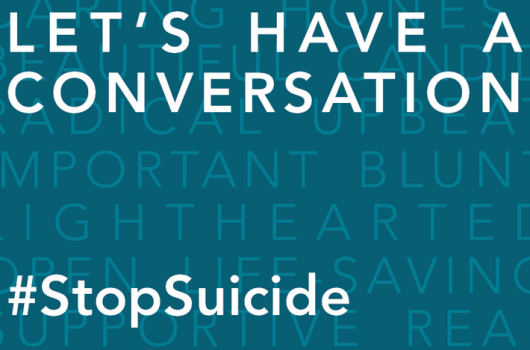The Importance of Being Supportive
 Image: American Foundation for Suicide Prevention
Image: American Foundation for Suicide Prevention
I’ve had episodes of depression since I was in college, and I attempted suicide back in 1970. Much later in life, I was hospitalized three times because I was suicidal. While I still experience episodes of depression, I usually do quite well—I haven’t had to be hospitalized in 16 years. I work and have a life.
A few years ago, I was having serious suicidal thoughts. My therapist was out of town, so I talked with my pastor. After we talked for a while, I shared with her that I always find strength and comfort in the belief that God shares in my pain and I am not alone. She then said,
“I believe, if you killed yourself, God’s heart would shatter because you were in that much pain and because of the pain you would cause others.”
I could shatter God’s heart?!? Surely that wasn’t true. Instead of continuing to contemplate suicide, my mind was boggled by the thought that I could shatter God’s heart. Then I remembered my favorite verse in the Bible—it has only two words: “Jesus wept.”
I knew from studying this verse in seminary that Jesus’ heart was severely broken because of the grief he saw surrounding Lazarus’ death. Jesus’ heart was broken even though he knew he would bring Lazarus back to life. How much more would God’s heart be broken, even shattered, if I was in such despair that I killed myself? I couldn’t kill myself.
It seems that about once or twice a year, I am plagued with suicidal thoughts, but I have a safety plan I always follow. I contact my therapist for support, take my meds to my daughter’s house so I can’t overdose, and see if my psychiatrist wants to change my meds. Because I always follow my plan, I don’t need to go to the hospital. One thing I haven’t done until recently was seek support from people at church, even though most of them know I struggle with depression. I didn’t seek their support because I didn’t feel comfortable asking for it.
I did, though, finally ask for support. On Sundays, we’re invited to write prayer requests on cards that are then collected and prayed for during worship. Almost two years ago, I started to write on a card that I was severely depressed. Immediately, I tore up the card and stuffed it into my purse. The next Sunday, I did the same thing.
Then I said to myself,
“If you cannot make this prayer request, who can? You have to make this prayer request so others will know they can also.”
And so I filled out the card and turned it in. After church, even though I am loved, not a single person said anything. I was not surprised. People don’t know what to say. And all they need to say is, “I’m praying for you,” “You’ll be in my thoughts,” or “I hope you feel better,” like they do when someone is sick.
At the next elders meeting, I shared that I was having suicidal thoughts. Following the meeting, three of the eight elders separately shared with me that at one time in their life they had been so depressed they had also had suicidal thoughts. I was surprised and thankful they had shared this with me. I was not alone. I was supported.
Please don’t let people feel alone. Say you’ll pray for them, say you hope they’ll feel better, or invite them out for coffee. Maybe offer to go with them to see their doctor, or bring them a casserole. Treat them as you would any friend who is having health problems. Don’t let them be alone. Be supportive.
Resources
- Mary Alice’s blog for the International Bipolar Foundation
- “Putting the Pieces Together: Becoming a People of Welcome and Support to People with Mental Health Challenges” presentation
Discussion Questions
- How does Christ share in your struggles and pain?
- How can the church be welcoming and supportive so people will feel able to ask for prayers and support?
- How would it be helpful if we shared our struggles with mental health disorders?
Print-friendly version here >>
If you are in crisis, please call the National Suicide Prevention Lifeline at 1-800-273-TALK (8255).
Image: American Foundation for Suicide Prevention, www.afsp.org.

Rev. Mary Alice Do, an ordained Disciple minister, has bipolar disorder and mild PTSD. She no longer pastors a church, but is an elder and works during the week as a Certified Peer Support Specialist in a mental health agency. Rev. Do wrote Resolution GA-1523 “Becoming a People of Welcome and Support to People with Mental Illness and/or Mental Health Issues” by the 2015 General Assembly of the Christian Church (Disciples of Christ). She also helps congregations respond to the resolution, directs the Mind Wholeness Project, and served on the NBA Mental Health and Congregational Care Affinity Group Research and Design Team. You can contact her at 520-440-3276 or maryalicedo@gmail.com.
Rev. Do is a guest blogger for the Mental Health and Congregational Care Affinity Group. This effort by the National Benevolent Association is in response to the passing of Resolution GA-1523. For more information, please visit www.nbacares.org/mental-health.